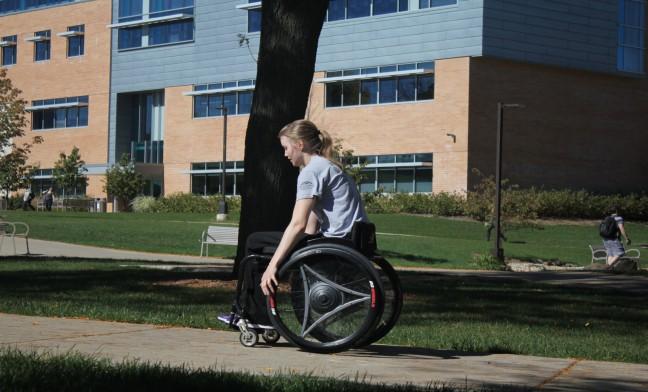In honor of the 30th anniversary of the passing of the Americans with Disabilities Act, the Public History Project held a live virtual presentation event about the history of disability at the University of Wisconsin.
The mission of the group is to increase awareness at the University of Wisconsin around the ADA and promote disability justice for all UW students, faculty and staff so the whole campus community feels included.
Public History Project Director Kacie Lucchini Butcher said the project grew out of a campus study group that looked into the history of two UW student organizations that called themselves the Ku Klux Klan in the 1920s.
For the past eight months, Butcher said graduate and undergraduate students have been researching the history of UW in the archives and conducting oral histories with students, alumni, staff, faculty and community members.
“An important part of this project is not only documenting the histories of exclusion and discrimination but making sure that those histories are being told by and from the perspectives of the people who experienced it,” Butcher said.
Project assistant for the Public History Project, Emma Wathen, researched the history of disability on campus and documented the instances when the university marginalized or patronized students, faculty, staff or community members with disabilities.
Wathen repeatedly found stories of students with disabilities who faced several challenges but very few records of people with disabilities on campus before the second half of the twentieth century.
“Given the stigma that has historically been associated with disability, it would not be surprising if references to people with disabilities often went unrecorded or overlooked,” Wathen said.
Wathen focused the presentation on the stories of two different students with disabilities who had attended University of Wisconsin.
The first is Debbie Horner who had to take a separate campus tour in 1975 as the route SOAR used was inaccessible to wheelchairs, Wathen said. During a class in the Humanities building, Horner was forced to sit in the doorway where it was not easy to hear.
Wathen said while in Van Vleck Hall, Horner did not know where the bathroom was, and when she asked, she was given a complicated set of instructions. Additionally, bathrooms that were marked as accessible had wide enough stalls for the wheelchair to get through, but not enough room to close the door. The director of housing at the time defended the lack of accessibility of student housing by saying there were not a large number of disabled students with college interest.
“The testimonies of UW students like Debbie Horner do not reveal a lack of interest but a lack of access,” Wathen said.
The second story was about UW law student Brigid McGuire after the Americans with Disabilities Act was passed. The same disabilities that Horner faced in 1975 reemerged for McGuire in 1994.
Wathen said McGuire accumulated nine parking tickets and missed several classes because she was unable to find a parking space close enough to the law building. Additionally, her wheelchair would not fit between the long skinny tables in her legal research writing class.
McGuire expressed to one of her professors that she could no longer keep doing this, so her only choice was to quit school or sue, Wathen said.
On September 4, 1997 McGuire cut off a portion of the desk to fit her motorized wheelchair. Wathen said Assitsant Dean Robert Correales vehemently responded to McGuire’s action and said the issue was only brought up to him in passing, even though it was far from an isolated incident mentioned in passing.
During a period of construction, Wathen said McGuire had been forbidden from parking on the grass. The police arrested McGuire and charged her with disorderly conduct when she tried to prevent her car from being towed.
The following day McGuire was hospitalized for the injuries she incurred during her arrest.
The Office of Civil Rights ultimately ruled there had been no discrimination. During the conflict, some UW students voiced their support for McGuire’s actions.
Ultimately, the Office of Civil Rights decided there was insufficient evidence to support the conclusion that the University discriminated against McGuire on the basis of her disability.
“It is clear that [McGuire] spent countless hours navigating systems that were supposed to help students with disabilities and running into barriers, both physical and bureaucratic,” Wathen said. “I think people are definitely more aware of some of the barriers people with disabilities face now and talk about it more openly, but there’s a long way to go.”


